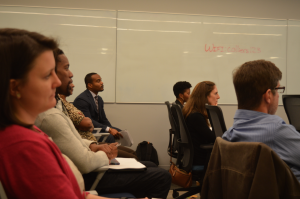 Finding and financing facilities is one of the largest obstacles that new and existing charter schools face. On Monday, March 25, GCSA held a facility workshop along with Colliers International, Reinvestment Fund, the Georgia Department of Education and Self-Help to aid charter schools as they search for a new school building, work to expand or seek to locate elsewhere.
Finding and financing facilities is one of the largest obstacles that new and existing charter schools face. On Monday, March 25, GCSA held a facility workshop along with Colliers International, Reinvestment Fund, the Georgia Department of Education and Self-Help to aid charter schools as they search for a new school building, work to expand or seek to locate elsewhere.

Tony Roberts, GCSA President & CEO
The workshop took place at Colliers International in Atlanta. Tony Roberts, GCSA President and CEO, welcomed participants to the workshop, and discussed the challenges Georgia charter schools face as they search for potential sites. Attendees then heard from Michael Rowland, Assistant Director of Facilities and Transportation for the Georgia Department of Education (GaDOE) and Kelland Waldrep, Education Research and Evaluation Specialist for GaDOE. Rowland and Waldrep spoke to participants about the department’s site approval process for charter school buildings. They said considerations for site selection include access to electricity, gas water, sewage, telephone and high-speed Internet. They also stressed that applicants must have the necessary signatures and documentation to ensure the building is safe. That documentation includes assurances from the Georgia Department of Natural Resources that the building is outside the 100-year floodplain and signatures from the local health or sewer departments verifying there is suitable sewer capacity and an adequate supply of potable water exists. Schools also have to consider if hazards like railroads, major highways, landfills, airports, power plants are present within a mile of the potential site. If they are present, they have to work with an engineer to make recommendations that would mitigate the hazards to make the site safe for the location of a public school.

L to R: Josh Gregory, Colliers International; Gavin Samms, Genesis Academy & Ehab Jaleel, Amana Academy
Participants also listened to a panel discussion that included Josh Gregory, Senior Vice President, Principal at Colliers International; Ehab Jaleel, Executive Director of Amana Academy; and Gavin Samms, Head of Schools for Genesis Innovation Academy. Gregory shared Colliers International’s experience with helping charter schools navigate the entire site selection process as well as the relationship the company maintains with the schools once they open. Jaleel and Samms shared their experiences with selecting and financing a school site. Both said having board members who understood the financing and site selection process was key.

L to R: Khaliff Davis, Reinvestment Fund; Brittany Bennett, Self-Help; and Molly Melloh, Reinvestment Fund
The meeting concluded with a panel on lending. Representatives from Reinvestment Fund, a mission-driven financial institution that creates opportunity for those who are underserved; and Self-Help, a family of two credit unions and nonprofit loan fund led the panel. Panelists shared various financing options and the criteria they use to determine whether they would finance a start-up or existing charter school such as a school’s proposed instructional program, community support, audit results, academic track record, and authorizer strength. When examining financing options, GCSA’s Tony Roberts told attendees it’s important to speak with several lenders to ensure they are getting the best possible deal.